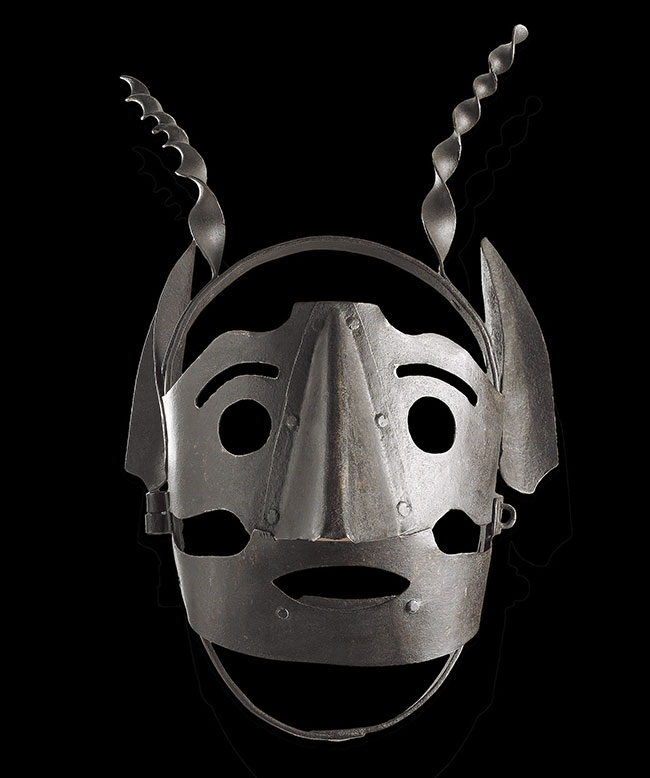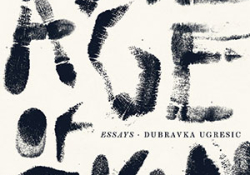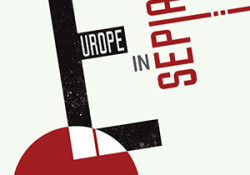The Scold’s Bridle

If there’s one thing that we know bonds women of all backgrounds, of all political colors, in all kinds of business and profession, it’s the classic experience of the failed intervention; you’re at a meeting, you make a point, then a short silence follows, and after a few awkward seconds some man picks up where he had just left off: “What I was saying was . . .” – Mary Beard, “The Public Voice of Women,” London Review of Books, March 20, 2014
1.
I was recently on an international panel with two other colleagues—writers, both men. The moderator was a woman. After we’d read our prepared texts, a question came from the audience to all of us. Before I’d had the chance to open my mouth, the moderator leapt spryly to her feet and whispered to me that I should keep it brief because we had very little time for discussion. My answer took twenty seconds. That was the shortest possible response I could devise. My first colleague spoke for fifteen minutes. The second was somewhat more modest: he spoke only for ten. All the while the moderator never blinked. After the discussion was over she came to apologize. I thought to myself, “Don’t worry, sister, we’re used to this” and smiled in response. She, too, smiled. We understood each other. This was a classic experience of the failed intervention that Mary Beard describes. True, this time my wings were clipped by a woman, hardly the first time this had happened to me.
2.
The scold’s bridle (or brank’s bridle, or branks) is an artifact we now see on display in museums, but from the sixteenth to the nineteenth centuries in Europe (England, Wales, Germany, and Scotland) it was used to punish women who had a lashing, scathing tongue, to punish chatterboxes, gossips, busybodies, yentas, yakety yaks, nags, harpies, shrews, vixens, quibblers, spitfires, hags, magpies, blabbermouths, loudmouths, prattlers, tattletales, hawkers, fussbudgets, floozies . . . In Walton-on-Thames one can see a scold’s bridle displayed in a church with the inscription: “Chester presents Walton with a bridle to curb women’s tongues that talk too idle,” because this Chester had apparently lost his fortune because of a gossiping woman; he donated the iron bridle to the city to stay women’s tongues. The first scold’s bridle was made in Scotland in 1567;1 apparently it was still in active use in Bolton-le-Moors, Lancashire, as late as 1856.
3.
The history of the “creative class”—artists, intellectuals, poets, philosophers—is long, dramatic, and almost entirely male, as is, of course, all of history. When we speak of the “public intellectual,” we all, men and women alike, automatically imagine men. There is, however, a parallel history that is seldom mentioned or even known: the history of female silence. “Mute” women, women who have been “muzzled” by men through the long history of gender relations,2 have factually and symbolically ensured (and still do) the intellectual, political, artistic, ideological, and every other form of male production. All this turns women into victims, but they, too, bear a serious share of the blame for today’s deplorable state of gender inequality.
4.
In her article “The Public Voice of Women,” Mary Beard quotes earlier examples of the brutal exclusion of women from the public sphere. Her examples come from the mythology of the classical world and history, such as the story of Lucretia, who was permitted to accuse her rapist publicly but only if her suicide immediately followed the denunciation; the story of Philomela, whose tongue was cut off by her rapist to prevent her from testifying against him; the story of Io, turned by Jupiter into a cow (and cows don’t speak, they moo); the story of Echo, forced by Hera, out of jealousy, to give voice only to the words of others; the story of Penelope . . .
Penelope was upset by the songs a street bard was singing, but when she called for a happier subject, Telemachus, her son, stopped her: “Mother, go back up into your quarters, and take up your own work, the loom and the distaff. . . . Speech will be the business of men, all men, and of me most of all; for mine is the power in this household.”
The Poet is a “wizard with words,” a “nightingale,” an “engineer of human souls,” but are not, likewise, the Priest and Politician? They, too, hawk illusions, and their job is to rule the mob. The Poet is his nation’s most venerable maven for public relations. History has been erected on a robust foundation built on the bond among the Politician, the Priest, and the Poet.
5.
The sphere of public speech from antiquity to today is ruled by the “law of Telemachus” and the holy trio, the 3 Ps, the Politician, the Priest, and the Poet. Why should the Poet elbow his way in among the Priests and the Politicians? Because they two are his smooth-talking “colleagues,” masters of hope. The Poet is a “wizard with words,” a “nightingale,” an “engineer of human souls,” but are not, likewise, the Priest and Politician? They, too, hawk illusions, and their job is to rule the mob. The Poet is his nation’s most venerable maven for public relations. History has been erected on a robust foundation built on the bond among the Politician, the Priest, and the Poet. The Politician, the Priest, and the Poet are the three-headed symbol of traditional national identity, the pillar of the nation’s authority. Of course in this holy trinity the Poet is the weakest link. These three Ps all have an identical alter ego, the fourth P, the Policeman.
Do women have a voice in church? Little or none. The Bible, the spiritual underpinning of Christian civilization, is deeply misogynist, much like the holy texts of all the other big religious systems. Do women have a voice in politics? Yes, when they say what the men in power like to hear. Do they have a voice in the media, in art, in literature? They do, and they have it more and more, but generally they are in the “lower sectors”: juvenile, pornographic, and genre literature. . . . Serious, canonical literature is still reserved for men. The literary canons are studied at school; consequently, generations and generations of children, male and female, ingest a “universalist” (male!) outlook on the world.
A contemporary poet genuflects in verse to the Croatian literary canon: What you’ve given me, oh Croatia / Are your books. / The verses of your poets / The lines of Hektorović, Ujević, Maruna, Gudelj, Šimić, Kaštelan. / A vast encyclopedia of sorrow.
To be honest, I’d say that today’s teens in Croatia are reading Harry Potter (if they read at all) or something like it, as do teens the world over. Teenagers have no clue who the names are in the “vast encyclopedia of sorrow.” In fact two of the names on the list are new even to me. I assume that for the Priest, Politician, and Poet, my (typically female) ignorance is yet another sign that they must push on with building their robust male canon.
6.
The “law of Telemachus” would seem, still, to apply. Perhaps this is because of the general patriarchalization of the societies in Eastern Europe after the fall of Communism; perhaps the reason for this are the new borders, new states, new animosities, the many migrations, the economic crisis, religious conflicts, religious fundamentalism, and the upsurge of nationalism. The church has assumed a strong role in all the post-Communist democracies, and it has returned the “women’s question” to the patriarchal framework. Women had only just found their voices, but now they’ve gone silent. Never have men perceived of women as equals, as serious conversants anyway, and women haven’t yet learned to speak to each other with their “intellectual messages” or to respect each other as interlocutors. Whether consciously or not, they always address him, the Man. The “law of Telemachus” is in full force, identical to the classical model of the absence of women from the public, intellectual, creative, political, and media spheres. Women are being sent back to their quarters. We find today’s “distaffs and looms” in the nonprofit organizations, in the quiet, hermetic circles of academia, in the women’s organizations that tackle “women’s subjects” (the trafficking of women, prostitution, the right to abortion, and so forth). All this difficult and important work remains under the radar. Nobody seems too exercised over the frequent news from India of group rapes of women or, for example, the million women every year forced into prostitution, but a mocking caricature of a Muslim religious leader that appears in the press is all it takes, and bingo, the whole world is on its feet.
It should be said that women have not relinquished their strategy of self-humiliation and self-injury in order to adapt themselves to men’s expectations. In this sense, Hans Christian Andersen’s Little Mermaid, who voluntarily gives up her ability to speak and in return is given woman’s legs (so the prince will like her) offers an unusually precise metaphoric pattern. A vast industry supports women in their efforts to satisfy men’s fantasies and participate successfully in the economy of traditional gender relations. Today their bodies can be shaped and reshaped, their bones, the color of their eyes, all this can be changed; their organs can be rejuvenated. Meanwhile, men are hard at work defending, bolstering, discovering, developing, advancing universal principles. Universal? Sure.
7.
With the fall of Communism, the position of women in the post-Communist societies deteriorated from its earlier status. The Communist image of the independent woman who’d been part of the workforce (in post–World War II propaganda this was a priority because the workforce faced a shortage of men and needed women!) was replaced by the image of the porn star or the submissive wife who winds herself her whole life onto three spools: children, church, kitchen. The resurgence of nationalist ideology in post-Communist countries has had a major impact on the instrumentalization of women. In Croatia (serving here merely as the example of post-Communist transition in the country I know best), some women have become members of the staid Academies of Science and Art, only thanks to having a political profile that satisfies their conservative colleagues; some have donned Ustasha uniforms in order to satisfy their black-shirt brethren and are raising their children to believe that the Jasenovac concentration camp into which tens of thousands of Jews, Serbs, Romani, and Croatian Communists disappeared was no more than a fiendish Communist fabrication.3 If one counts the number of young women momentarily visible within the ruling Croatian political elite, the right wing would even appear to be more “gender sensitive” than the other political constellations.
The resurgence of nationalist ideology in post-Communist countries has had a major impact on the instrumentalization of women.
The sponzoruša (or hottie) would seem to be the most sought-after role for a woman in post-Communist societies.4Naked young women who crouch on their hands and knees, serving as mute side tables for the cigar ashtrays in Russian steam baths for the filthy rich (a story I heard from a reliable source) are just one morbid detail of post-Communist everyday life. Pop stars who are low in the hierarchy of professional qualifications, such as Severina in Croatia and Ceca in Serbia, have become rich and famous national princesses and serve as models for legions of little girls and young women to emulate them throughout the lands of the former Yugoslavia. However, even highly qualified businesswomen do not pass up the opportunity to parade their traditional medals. A Zagreb physician I know declares on her website that she’s married and is the mother of three sons. There’s a Catholic crucifix flashing at her throat, signaling that the respected doctor is a Catholic and, hence, a Croat. Her professional qualifications and achievements hold only third place in her hierarchy of values.
Women can, indeed, succeed in post-Communist societies and realize their right to a public voice. In fact they can even become president. The current president of Croatia, Kolinda Grabar-Kitarović, is a walking instruction manual for “what a woman has to do to become president in a post-Communist society.” Grabar-Kitarović presents herself as a “womanly” woman (she’s not a “man in a skirt”), she’s ethnically “pure” (a Croat), she’s religious (Catholic), and socially acceptable (married, mother of two). Grabar-Kitarović is a female poltroon: she touts her public respect for all levels of male authority, especially the military. She likes having her picture taken while in military regalia, posing in relaxed scenes with Croatian soldiers. Grabar-Kitarović publicly declares her sympathy for the HDZ, the leading Croatian right-wing party, and political analysts say she is its exponent. When asked who her political model is, she names Margaret Thatcher.
8.
Twelve hundred Croatian high school seniors were recently surveyed (according to the newspaper Jutarnji list), and the responses showed that 75 percent of them believe the Independent State of Croatia was not, in fact, a fascist puppet state; 40 percent disapprove of the prosecution of crimes committed during the war between 1991 and 1995; 49 percent believe homosexuality to be a disease; among the high school seniors, 43 percent were serious Catholics and 25 percent were “lukewarm” believers. Politicians, ministries of culture and education, the governmental bureaucracy, media, journalists, writers, public figures, professors, teachers, the Croatian Academy of Science and Art, schools, university departments, publishers, parents, and the ever-present Catholic Church—all worked diligently and in concert to foster these devastating statistics. Did the men and women of Croatia protest the children’s statistical profile? They did not.
There are, however, shining examples of women in post-Communist societies who have dared to raise their voice. Their history—after the fall of the Wall, after Yugoslavia collapsed and the independent countries were formed in what used to be Yugoslavia—is a brave chronicle of harassment by the media, institutions, police, men, women, politicians, and any number of others. The alternative failed politics of dissent has lasted a quarter of a century, exactly as long as the successful politics of assent.
9.
In November of last year, parliamentary elections were held in Croatia. A patriotic coalition won, led by the right-wing party. Members of the party celebrated their victory. A video of the celebration made the rounds in the media. The video shows a squat little man who, in a euphoric frenzy, spreads a Croatian flag out on the ground. A circle of men closes around him, chanting, “Kiss it! Kiss it!” Egged on by the chants of the mob, the man kneels and kisses the flag. The mob chants: “Go! Go! Go!” The man flips over onto his back and at this point looks like a baby squirming on its diaper. Enchanted by the sight, another man flings himself down on top of the first and showers him with kisses. The mob, a little startled by the sight of the two exalted men, starts chanting: “Franjo, Franjo.” This necrophiliac emotional twist, their invocation of the dead “father of the nation,” Franjo Tuđman, has a Viagra-like effect, and the chanting soon spills over into “Croatia, Croatia,” a sort of uninterrupted, massive, political orgasm. The squat little man scrambles to his feet, retrieves his flag, and, what do you know, now he’s brandishing two: the big cloth flag and a little paper flag on a stick: a “mother” and “daughter” duo.
In all Slavic languages, the word “homeland” is a noun of the feminine gender; the homeland is the mother, and defending her is men’s work. Sexual impotence, homophobia, patriarchalism, Catholicism, a castration complex, and misogyny—all these together fuel the celebratory political orgy. Women in the territory of the former Yugoslavia have had ample opportunity to observe such “orgies.” We only need think back to the freshest examples over the last year or two, the most recent being the release from remand of Ivo Sanader, former Croatian prime minister, who had first been sentenced for corruption and then retried. Sanader, who had stolen millions—thanks to agile attorneys and wealthy friends who put up his bail—was released. Knowing the Croatian system of jurisprudence, many had been certain that Ivo Sanader would never actually serve his sentence. As he left he was greeted by a group of men who, stamping their feet penguin-like in front of the prison, wailed: “Ćaće, Ćaće!” (Daddy! Daddy!). Some say this greeting was a deliberate parody of the situations that have been arising all too often in the criminal, corrupt daily life of Croatia. When murderer and racketeer Branimir Glavaš emerged from jail after a brief sojourn there, he, too, was welcomed by an adulatory mob of admirers. When Zvonko Bušić Tajko returned from serving his sentence in a United States prison for killing two US policemen while hijacking a US airplane, he, too, was treated by the admiring mob as the national hero who’d commenced the struggle for Croatian independence with his act of terrorism. When from prison (or life abroad) murderers, criminals, robbers, who had “suffered” their prison or expatriate “indignity” for the sake of Croatia, came home, they were all welcomed by throngs of fans. And when General Ante Gotovina returned from the Hague prison, convicted for war crimes yet subsequently acquitted, his welcome was a true explosion of national rapture. It would seem that in contemporary Croatia (and Serbia, Bosnia, Montenegro, Macedonia, Kosovo, Bulgaria, etc.) the most desirable occupation for men is to be a criminal, a war criminal, or, in more benign terms: a person of dubious moral standards.
Right now the streets of Zagreb are thronging with tens of thousands of people, locals from Zagreb but also others pouring in from the Croatian provinces, to touch the glass coffin in which lies in state the incorrupt body of a tiny (four-foot three-inch tall) Croat, Leopold Mandić, a Capuchin priest who was canonized by the Italian Catholic Church. This garden gnome replete with long, gray beard, laid out in his glass coffin like Snow White, has provoked a genuine eruption of Catholic euphoria. For five days the Croatian media have been following both the tiny body in its tiny coffin and the Croat populace marching alongside it, touching the glass; they all seem to have forgotten how forty years ago masses of them lined up along the Ljubljana–Zagreb–Belgrade railway tracks and waved, tears in their eyes, at the blue train that was carrying the dead body of Yugoslav president Tito. Democracy clearly depends on the choice of corpses to which people bow. And while thousands of Croats bow down, exactly as if they live in a Catholic caliphate, to the incorrupt corpse of St. Leopold Mandić, the Croatian government is supporting all treaties that obstruct refugees from traversing their territory. The fact that the refugees have no intention of remaining in this small, impoverished, xenophobic country only serves to strengthen their arguments.
A question, however, cries out to be asked: Are women protesting these “local customs”? Not really. Though they seldom stand out in front of prisons fêting local criminals with forlorn cries of “Daddy! Daddy!” (that is the job of the “upstanding” men!), the absence of rebellion against the warped system of values, the first victims of which will be their own children, makes them complicit. And moreover, women often turn against other women, joining in the sort of pathetic rivalry that often surfaces among members of suppressed groups.
10.
For years I have been trying to dodge the label “Croatian writer” or “Croatian writer who lives in Amsterdam,” though my life experience has confirmed that this sort of tattoo is almost impossible to remove. Why? Because most people use ethnic coordinates when remembering, classifying, defining, and judging others. I’m not comfortable with the label “Croatian writer.” Why? Among other things because (had I stayed in Croatia) I would have been constantly exposed to scenes like the ones described above, and I find them difficult to stomach. Consequently, in Croatia (like, indeed, so many other places), male writers represent their homeland, state, nation, and national literature; their works harmoniously build the national literary canon. Female writers may either profit by or be victimized by such constellations. Mostly they are victimized. The three women who have laid the shaky foundation for the Croatian women’s literary canon—Ivana Brlić-Mažuranić, Marija Jurić-Zagorka, and Vesna Parun—met tragic ends: the first committed suicide, the second died in penury and neglect, and the third played the clown, shunting back and forth between the two options facing her predecessors.
I was recently honored with an international literary prize. The news reached the ears of my exemplary countrymen, though precious few chose to mention it in the media. One critic wrote a review of my most recent book and mentioned the prize as an aside. The reviewer remarked that this “major prize was as much a prize for the oft-overlooked Croatian essay,” to which “I owe (my italics) my voice and form.” Did this review, perchance, appear in a right-wing rag? Oh, no, it was published in a politically left-leaning paper (the only one, by the way), for which write the finest Croatian journalists. Men, it goes without saying. The verb owe was what irked me the most. I owe my success, apparently, to the oft-overlooked Croatian male essay, which deserves to be recognized and honored abroad; it would be simply unthinkable for me to owe my success to myself and my very own “voice and form.” I should add that this review was almost the only public “congratulatory” gesture coming from my former domestic literary scene. That this gesture instructed me to bow down to the shadows of third-rate and, furthermore, oft-overlooked Croatian essayists, that I admit to being the ingrate daughter of the paternal essayistic tradition, hardly warrants mention, does it?5 Just as there is little point in saying that the Croatian essayistic pens appear to have permanently run me out of the so-called domestic literary space. So to whom am I to bow down then? To my hometown “literary executioners”?
Misogyny is so ordinary, so deeply rooted, so ever-present, and so flagrant that no one—even those who disseminate it, even its victims—sees it.
Misogyny in the little Balkan countries is a knee-jerk response. Misogyny is so ordinary, so deeply rooted, so ever-present, and so flagrant that no one—even those who disseminate it, even its victims—sees it. I should also add that misogyny truly knows no geographic, class, race, gender, ethnic, or political bounds. Its target is simple and precise: women.6
11.
Perhaps, inspired by the episode of the two men kissing on top of the Croatian flag, we might muse on the following . . .
Apparently flag desecration is on the books in most countries around the world as a crime, a form of behavior subject to criminal penalty. The most common forms of desecrating the flag are urinating on it or burning it, though according to the United States Flag Code, “a flag, when it is in such condition that it is no longer a fitting emblem for display, should be destroyed in a dignified way, preferably by burning.” In Austria, desecration of the flag is illegal, and perpetrators may be sentenced to six months in prison. In France, desecration of the flag incurs a prohibitive fine or six months behind bars; in Germany someone who commits an act of desecration may be sentenced to as many as five years in jail, while in Croatia and Romania they may receive a sentence of up to three years. In Turkey, the burning of the flag is banned, and one may earn a three-year sentence by so doing, but the sentences for the actual deed of lowering the flag are far more serious. In Belgium, there is no ban for desecration of the flag. In Denmark, one mustn’t desecrate the flags of other countries, but one’s own is fine.
Now, we wonder, what are the sentencing guidelines under Croatian law for rape, or “desecrating the honor of a woman,” and how do things stand in practice? Well, it’s like this. According to Croatian law, “if the crime . . . resulted in the death of the raped person, or serious physical harm, or the person’s health is gravely compromised, or the raped female person was thereupon impregnated, the perpetrator shall be sentenced to no less than three years in prison.” Three years. The perpetrator is to be sentenced for “desecrating a woman’s honor” (to use the patriarchal phrase) according to Croatian laws for precisely as long as for desecrating the Croatian flag. I have never heard of a court hearing a case about Croatian flag burning. But I do know of many cases of rape, beatings, and murder of Croatian women that were perpetrated by men. Hundreds are reported every year, though many more go unreported. The victims in almost 80 percent of the cases know the rapist. The rapist is their husband, boyfriend, neighbor . . .
We should say, by the way, that the people of the Faroe Islands have elegantly resolved the question of their national flag by claiming that it is not possible for them to desecrate their flag with words or deeds. How the Faroese have resolved the question of women, or whether they have resolved it at all, I cannot say.
12.
Mary Beard ends her inspired article about the public voice of women with a legend. Cicero is lynched and killed. His head and right hand are on display on the speaker’s platform at the Forum. Fulvia, Mark Antony’s wife and a frequent victim of Cicero’s speeches, arrives to inspect the head of her enemy. According to the legend, Fulvia plucks a hairpin from her hair and with it stabs Cicero’s tongue.
Let us stop and think now about how many symbolic hairpins would be needed to uproot the global historical practice of women’s silence, and how many more it would take to ensure a global vocality and a versatility for women’s voices. One voice and one hairpin don’t amount to much. A powerful, massive movement is what matters for change, a multitude of strong women’s and men’s voices singing in unison, which will, together, obliterate the sly ways of misogyny, ways that coddle the petulant ego of many men while assuaging the frightened hearts of many women, create billion-dollar profits in the media industry alone, delight the masses, please the politicians, and legitimize the criminality of fundamentalists of all faiths.
Amsterdam, April 2016
Translation from the Croatian
By Ellen Elias-Bursać
Footnotes:
[1] Some twenty years later, William Shakespeare wrote The Taming of the Shrew.
[2] The term mansplaining has recently entered the parlance to describe men muzzling women, interrupting and obstructing their speech, patronizing and sabotaging their words.
[3] The Ustasha were Croatian fascists during World War II. Jasenovac, known as “The Auschwitz of the Balkans,” was a Croatian extermination camp during World War II.
[4] The Russian slang word for hottie is tyelka or little calf, which is just a modern iteration of silent Io, transformed by Jupiter into a cow.
[5] Miroslav Krleža was not named among the Croatian essay writers in the review, and besides, only men deserve to be compared to him, as they bestow on each other compliments such as “upright” and “upstanding.” The traditional place of the woman is invariably associated with a fall (a moral fall, of course), and hence, within these male-sexist mental constellations, the woman is seen not as “vertical” but as “horizontal.”
[6] Misogyny often appears in camouflage, behind masks, cropping up where we least expect it, in innocent boyhood fantasies about the ideal partner, such as: “. . . and later on, if I wanted to get married or something, I’d meet this beautiful girl that was also deaf-mute and we’d get married. She’d come and live in my cabin with me, and if she wanted to say anything to me, she’d have to write it on a goddamn piece of paper, like everybody else” (J. D. Salinger, The Catcher in the Rye [Penguin Books, 2010], 214).

















